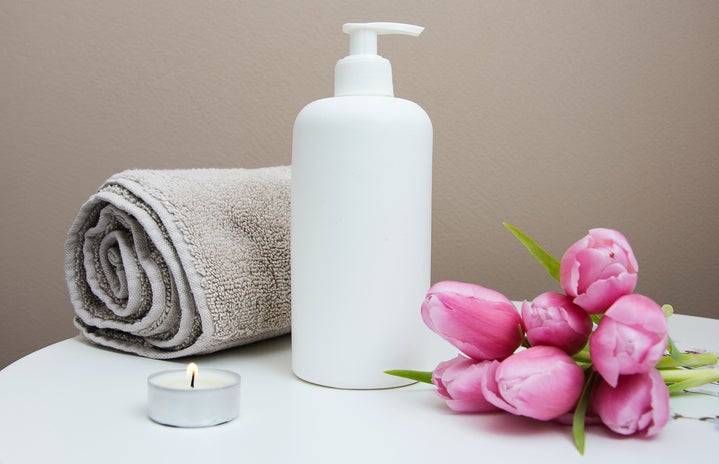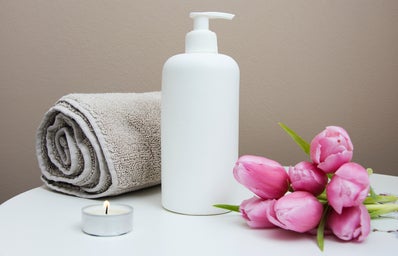The opinions expressed in this article are the author’s own and do not reflect the views of Her Campus.
Every beauty lover has questioned the merit of their skincare routine at least once in their lives. While we all love how velvety our faces feel after coating them in sheet masks, serums and moistures, sometimes it seems like even our go-to skincare products don’t work on our acne-prone skin. Although we know that our skincare regime won’t make us look like a knockoff KarJenner, we’re still fascinated with skincare because beauty products aren’t just about outward beauty — they make us feel better physically, emotionally and psychologically.
Unfortunately, not everyone understands that beauty lovers don’t invest in their skincare solely just to make themselves look like the best versions of themselves. Shortly after Glossier launched their new skincare exfoliant, The Outline published a controversial article which used one of Glossier’s new products as leverage to question the virtue of skincare as a whole. As a self-proclaimed beauty lover and an advocate of self-care and mental health, I’m using my platform to discuss why this article written by Krithika Varagur felt as problematic to me as it claims the skincare industry to be.
The first line of the article reads, “Perfect skin has become the thinking woman’s quest.” Shortly thereafter, Varagur describes how troves of beauty lovers brag about the money they spend on skincare products and how the beauty industry price-gouges products with often inexpensive ingredients.
It should go without saying how exclusive these opening statements are, but let me dissect the imprecision of this for a moment:
- First, it implies that “un-thinking” women don’t pursue perfect skin. What even qualifies a thinking woman versus an un-thinking woman? Am I an un-thinking woman because I don’t want flawless skin? Or am I a thinking woman because I regularly use skincare products, so I must subconsciously be questing for perfect skin?
- It suggests that only women want perfect skin. Statistically, more women buy skincare products than any other gender, but women aren’t the only people who buy them.
- It suggests that women only buy skincare products to alter their appearance. When anyone buys a moisturizer or serum, their sole goal isn’t just to get “perfect skin” or to decrease their hyperpigmentation. Sure, it could attribute to the many reasons why someone would buy a skincare product, but it isn’t the only reason.
She continues by explaining that the skincare industry is exceptionally problematic to women because they “are disproportionately taxed by both the ideal of perfect skin and its material pursuit.” As I explained above, women aren’t the only consumers of skincare and beauty products. Nevertheless, many people don’t buy skincare products to attain this obviously mythological “perfect skin.”
Later, Varagur writes, “Like other human organs, skin has withstood millions of years of evolution without the aid of tinctures and balm.” If we discuss the purely cosmetic component of skincare (like The Outline’s article does), every person’s skin changes. Everyone’s epidermis reacts differently—to the ever-changing outside environment, seasons and our hormones. Because our skin persistently fights off multiple changing variables, various brands have evolved their skincare products to help keep our dermis healthy despite these diverse factors. Historically, skincare has come a long way, even if it still has a long way to go.
The article is correct: your skin is a highly evolved organ. While your skin may be one of your few self-cleaning organs (in that it dispels sweat from your pores), your skin still can’t wash itself, which might explain why so many people buy facial and body soaps and subsequently moisturizers to ensure a barrier of hydration protects their freshly cleaned skin.
There is a difference, and it’s not an argument she makes in her article. This is an across the board shaming of women for washing their faces.
— Katelynn McGinley (@katelynnmorgan) January 30, 2018
Regardless, the skincare industry houses products beyond balms and serums that promise to make your skin poreless and pimple-less. The central issue here is that this article focuses on skincare products that only aid people in their search for perfect skin. But skincare isn’t skin deep.
Promoting body positivity for yourself and others is a vital step to upholding positive mental health and self-love. One of the critical components of body positivity is doing things you love. If you like skincare products, then you should continue to buy skincare products. Depriving yourself of an essential part of your self-care because of a few skincare product horror stories can have resulted in an equally negative impact.
Andrea Rodriguez, Co-Founder of Chalet Cosmetics, a brand that was founded on the idea of turning your beauty routine into a ritual, tells Her Campus that “incorporating beauty and skincare products absolutely help strengthen your self-care routine because it allows you to set aside time just for yourself and helps you recognize your inner and outer beauty. Simply put—the beautification process makes you feel pretty, thus strengthening your sense of self-worth. Studies have shown women who wear makeup and invest in proper skincare are more likely to advance in their careers and have an overall higher confidence. Spending time on makeup and skincare routine forces a person to nurture their inner beauty.”
Conversely, there is a difference between loving skincare because of how it makes you feel, versus being obsessed with skincare because you rely on it to change you. Fixating on your skin’s appearance can have a detrimental impact on your body image and overall self-esteem, which is why you shouldn’t take it lightly if you couldn’t fathom a day without beauty products.
Regardless, the simple installation of a consistent skincare routine itself can help you alleviate everyday stress and anxiety.
Beauty expert and Founder of Skin Care Ox Diane Elizabeth explains to Her Campus, “Taking care of your skin requires, at most, five minutes in the morning or evening. Not having time for a simple routine could be an indication of a stressful lifestyle or cluttered mind. Self-care is all about slowing down and taking time out for you! It doesn’t always have to be about lavish bubble baths or epic nature walks, sometimes it’s just about paying a little more attention to your own needs and indulging in them. By making a skincare routine a part of your morning/evening, you build up the habit of relaxing and taking care of yourself—which is calming and a major boost to self-esteem.”
“Beauty is about taking care of yourself and taking pride in your efforts. I take care of my skin not with the goal of achieving a flawless complexion, but because my routine allows me to to turn my music on, light a candle, and slow things down.”
—Michael Joerres, @IntoTheGloss— Glossier (@glossier) February 1, 2018
Beyond the sexist implications and the superficial analysis of the skincare industry, problematic ableist vocabulary afflicts this article. Krithika Varagur uses terms and phrases, such as “craze” (when referring to the skincare industry) and “psychotic-seeming” (when referencing Biologique Recherche P50). This problematic language not only antagonizes skincare lovers by implying they can’t think for themselves, but it also propagates harmful stigmas about people with disabilities and chronic pain. Misusing jargon for a legitimate diagnosis makes this an ableist slur because it invalidates people with psychological conditions and disabilities who often deal with the stigmas that these words entail. Words matter, especially in journalism. Choosing to use albeist slurs isn’t just inappropriate, it desensitizes the impact that these words have.
While the author of this piece likely didn’t intend for these words and phrases to be offensive, they are. Often, people with disabilities have been insulted by these same words and, at the time, they were meant as insults. Although the intent of these words is often lost to people without disabilities, the connotation isn’t lost to people with disabilities. In turn, continuing to use these terms to undermine a group of people—in this case, skincare consumers and the products themselves—is problematic. Using words that were once, and still are, an insult to people with disabilities and chronic illnesses to berate another group of individuals only contributes to the problem.
Aside from the problematic diction, the take also slowly transmutes to fear-mongering consumers about many supposedly dangerous skincare ingredients.
As Varagur describes common active ingredients, such as retinol, chemicals exfoliants and hydroxyl acids, it paints this illustration that consumers are too uneducated to understand how to incorporate these potentially harmful ingredients in their skincare routine.
Our diets, hormones, pollutants, and occupations are completely different than they were 50, 100, and 1,000 years ago. Skincare is rising to meet a demand of issues Cleopatra most likely didn’t have in her day. Also, we don’t die at age 25, anymore
— Marie Claire (@marieclaire) January 30, 2018
As someone who has personally suffered chemical burns from skincare products, it isn’t always harsh chemicals or ingredients that ignite these adverse reactions. However, my chemical burns didn’t come from retinol or exfoliants. They came from soap foam. Yes, foam. After suffering periodic chemical burns, scaly skin and welts, I finally found out that the lathering agent found in most soaps was the culprit. After showering in room temperature water and making my own non-foaming and unscented soap, I stopped getting chronic burns and bumps all over my body and face.
Active ingredients and acids weren’t the cause of my tormented skin. In fact, I still have retinol and exfoliants in my skincare regime—I just use them sparingly, as I’ve learned that’s the best approach for my skin. Yet, I can’t take credit for my skincare breakthrough (which I use to benefit my physical health, mental health and outward appearance), because my dermatologist diagnosed what was happening with my skill and came up with a proactive prognosis to alleviate my blistered dermis. It’s unreasonable for every skincare lover to pursue a degree in dermatology and biochemistry just to feel safe enough to put a serum on their cheeks (or shoulders). However, we can learn how to implement healthy skincare practices from a trusted dermatologist.
Implying that people don’t need skincare (regardless of the purpose) is just as dangerous as advising someone to use a harmful product. Skincare, when used correctly and healthily, can have exceptional results.
For example, psoriatic arthritis can symptomatically improve from using regular moisturizers on afflicted areas. Plus, cystic acne, which is often painful, can benefit from personalized anti-inflammatory skincare routines (and typically oral medication). The subtle ableism (and not-so-subtle sexism and gender roles stereotypes) within this article implies that people only use skincare for one purpose. In reality, there are copious reasons people use skincare products. Thus, there are multiple reasons to see a dermatologist beyond making your face look “perfect.”
Because this piece attacks the beauty industry on a surface level, it fails to acknowledge the diverse applications of skincare, and therefore the various reasons consumers buy skincare products. For an article that seems to prosecute people for buying skincare products for their outward appearance, it appears this article only probed the “literal outermost layer” of the skincare industry and its consumers.


